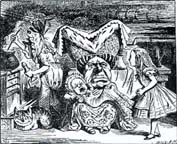When Alice arrives at the Duchess' house, she has yet to understand that chaos and irrationality define Wonderland. Therefore, occurrences that other characters accept without question frequently astound her:
At this moment the door of the house opened, and a large plate came skimming out, straight at the Footman's head: it just grazed his nose, and broke to pieces against one of the trees behind him.
— or next day, maybe,' the Footman continued in the same tone, exactly as if nothing had happened.

The Footman remains completely unfazed by the near miss, demonstrating his acceptance of Wonderland's constant irrationality. Alice cannot come to terms with this mindset, declaring "Oh, there's no use in talking to him... he's perfectly idiotic!" As she proceeds into the house, the level of chaos increases. The cook hurls utensils, the soup reeks of pepper, and the Duchess sings poems to a piglet. There initially appears to be a semblance of a hierarchy, but this turns out to be an illusion, as a pig occupies the highest social position within the house, and humans are the cooks and caretakers. Alice, still searching for a semblance of order in this world of disorder, becomes ever more frustrated.
Alice's encounter with the Cheshire Cat offers her an opportunity to better understand Wonderland, but she unfortunately considers the cat's advice nonsensical. Its seemingly simple declaration that "Oh, you can't help that... we're all mad here. I'm mad. You're mad," is one of the most logically sound statements of the entire novella. To truly understand Wonderland, one must fully give in to its madness and accept its regular irregularity. Ironically, even though the Wonderland's inhabitants appear mad to Alice and the reader, Alice would herself appear mad to those same inhabitants because of her desire to find rules in an inherently irrational world.
Questions
1. When Alice asks the cat how it knows she is mad, it replies "You must be... or you wouldn't have come here." Does it mean that one must initially be mad to enter the dream of Wonderland, or that one becomes mad upon arriving?
2. Why does Carroll create a completely inverted social hierarchy in Wonderland, rather than abolishing social structure and conventions entirely? Which strategy would make Wonderland appear more irrational?
3. A few characters in the novel, including the Cheshire Cat, actually offer bits of helpful advice in the midst of their senseless banter. What are the other characters that play this role, and how well does Alice receive their advice in each case?
Last modified 19 March 2010